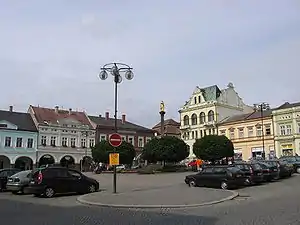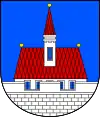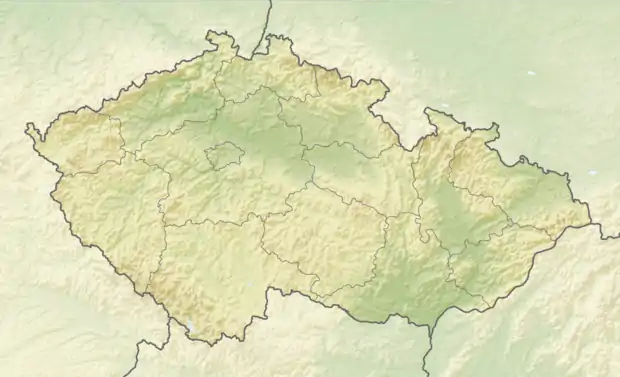Ústí nad Orlicí
Ústí nad Orlicí (Czech pronunciation: [ˈuːsciː ˈnat orlɪtsiː]; German: Wildenschwert) is a town in the Ústí nad Orlicí District in the Pardubice Region of the Czech Republic. It has about 14,000 inhabitants. The town lies in the Orlické Mountains where the Tichá Orlice and the Třebovka rivers meet.
Ústí nad Orlicí | |
|---|---|
Town | |
 Peace Square | |
 Flag  Coat of arms | |
 Ústí nad Orlicí Location in the Czech Republic | |
| Coordinates: 49°58′26″N 16°23′37″E | |
| Country | |
| Region | Pardubice |
| District | Ústí nad Orlicí |
| First mentioned | 1285 |
| Government | |
| • Mayor | Petr Hájek |
| Area | |
| • Total | 36.36 km2 (14.04 sq mi) |
| Elevation | 340 m (1,120 ft) |
| Population (2020-01-01[1]) | |
| • Total | 14,280 |
| • Density | 390/km2 (1,000/sq mi) |
| Time zone | UTC+1 (CET) |
| • Summer (DST) | UTC+2 (CEST) |
| Postal code | 562 01, 562 03, 562 04, 562 06 |
| Website | www |
Administrative divisions
Town parts Hylváty, Kerhartice and Knapovec and villages Černovír, Dolní Houžovec, Horní Houžovec and Oldřichovice are administrative parts of Ústí nad Orlicí.
History
Wildenschwert was founded in the second half of the 13th century, during the reign of Ottokar II of Bohemia.[2] It was first called Wilhelmswert after Wilhelm von Dürnholz, who was one of the colonizer, and was part of the Herrschaft Landskron. The town was first mentioned in a written document from 1285, when the Bohemian King Wenceslaus II gifted the town to Zavis of Falkenstein.[2] In 1292, after Zavis' death, Wenceslaus II gifted the town to the Cistercian monks at Königsaal. They passed the town to the Leitomischl bishopric in 1358. After the Hussite Rebellion, when the churches influence was eclipsed, the town was owned by the Kostka von Postupice, the von Pernstein and the Hrzan von Harras families. Wildenschwert was first referred to as a town in 1544.
Since the end of the fifteenth century Wildenschwert was host to the Bohemian Brethren but expelled them in 1626 in the wake of the counter-reformation. Then after the Battle of White Mountain, 8 November 1620, Wildenschwert was under the control of the Dukes of Liechtenstein. There were Guilds of Weavers established here in the sixteenth century. The town was slow to recover from the lootings of the Thirty Years' War, then was destroyed by fire in 1706. It gained municipal status in 1795. When Wildenschwert was connected to the railway network by the Olomouc – Prague Line in 1845, the textile business boomed. It gained the tagline of The Manchester of Eastern Bohemia, and became an important textile centre. It was an important railway junction and from 1850 became a regional centre. It was given the Czech name of Oustí or Austi; the nad Orlicí refers to the name of the local river.
Wildenschwert was a German-speaking town in Austria-Hungary until it was allocated to Czechoslovakia in 1918 at the conclusion of the World War I. Ústí nad Orlicí as it was now called remained an important textile town, and in the 1960s the Výzkumný ústav bavlnářský (Cotton Researching Institute) developed the Open end spinning technique that provided a faster alternative to ring spinning.
Notable people
- František Martin Pecháček (1763–1816), composer
- Leopold Jansa (1795–1875), violinist and composer
- Quido Kocian (1874–1928), sculptor
- Fritz Löhner-Beda (1883–1942), Jewish author
- Jaroslav Kocian (1883–1950), violinist
- František Korte (1895–1962), composer
- Oldřich Marek (1911–1986), entomologist
- Michal Šlesingr (born 1983), biathlete
- Ondřej Moravec (born 1984), biathlete
- Jaroslav Kulhavý (born 1985), mountain biker, 2012 Olympics winner
- Kamil Vacek (born 1987), footballer
Twin towns – sister cities
Ústí nad Orlicí is twinned with:[3]
 Amberg, Germany
Amberg, Germany Bystrzyca Kłodzka, Poland
Bystrzyca Kłodzka, Poland Massa Martana, Italy
Massa Martana, Italy Neukölln (Berlin), Germany
Neukölln (Berlin), Germany Poprad, Slovakia
Poprad, Slovakia
References
- "Population of Municipalities – 1 January 2020". Czech Statistical Office. 2020-04-30.
- "Historie města" (in Czech). Město Ústí nad Orlicí. Retrieved 2020-08-26.
- "Partnerská města" (in Czech). Město Ústí nad Orlicí. Retrieved 2020-08-26.